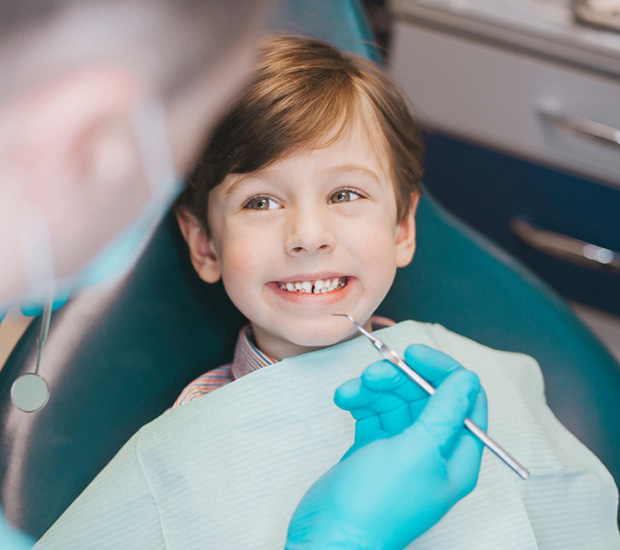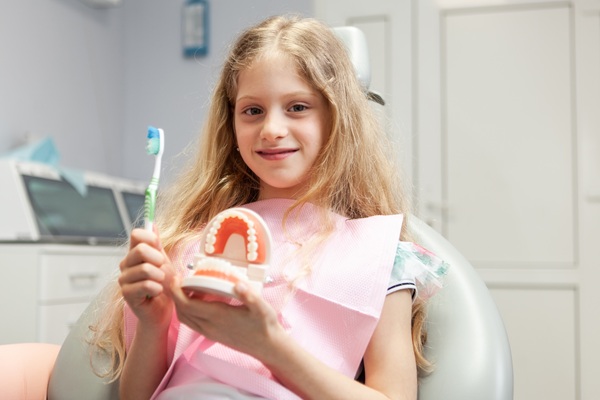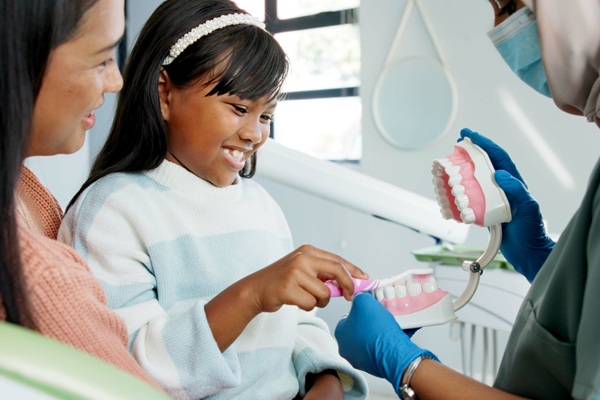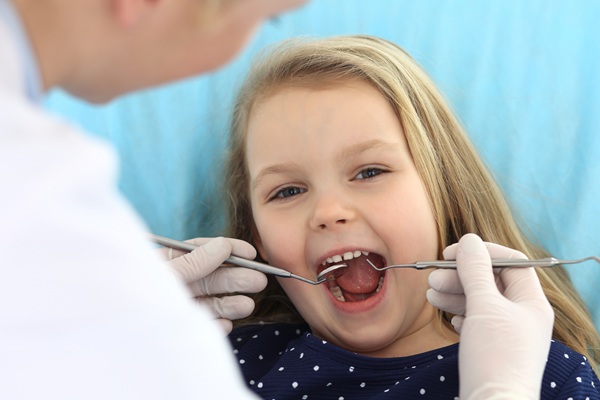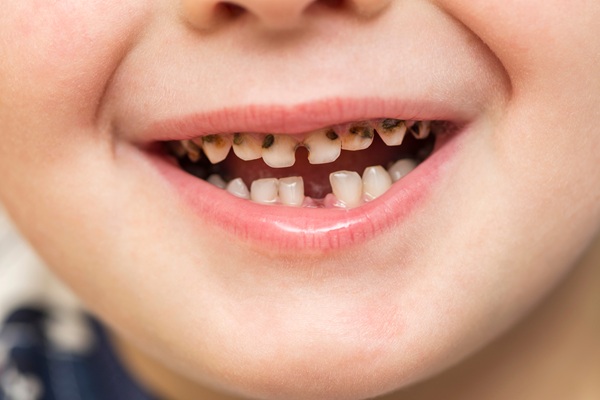Complete Diagnostic ExamAsheville, NC
A routine complete diagnostic exam is the most effective way to keep a patient's smile in top form and prevent dental emergencies and other problems that may require extensive treatment. At Dennis R. Campbell, DDS, our pediatric dentist will examine the state of the child's teeth and gums to determine their oral health needs, as well as examine existing dental restorations to ensure they are in optimal condition.
With a complete diagnostic exam, our team can help to address the various aspects of a child's oral health, growth, and development. The diagnostic exam often includes a digital dental X-ray, oral health risk assessment, and discussion about the child's diet and oral hygiene habits.
Call us at 828-254-7291 to schedule an appointment and learn what treatment your child needs.
Overview of a Complete Diagnostic Exam
The dental diagnostic examination happens during a dental checkup and is a process used by a dentist to assess the condition of a patient's oral health. The exam generally involves the entire oral cavity, as part of a first-time dental appointment or regular biannual checkup. We can use the diagnostic exam to discover a particular issue in one area of the mouth, including broken teeth, pain, swelling, pain, or other dental issues.
An oral examination has four significant steps:
Complete oral evaluation
The complete oral examination is necessary for patients who are visiting a new dentist for a dental checkup for the first time, or if they have not visited the dentist in a long time.
Periodic (routine) oral evaluation
Periodic evaluations are part of the biannual dental checkup procedure. A periodic oral exam is a comprehensive update of existing dental information for existing patients who visit the dental office regularly. A periodic exam may not include X-rays, depending on the last time a scan was taken. However, the X-ray may be required if the dentist discovers an issue that needs a scan or if the patient complains about pain or other symptoms when they come in for the checkup.
The dentist may use a tool called "explorer" to examine the patient's gums and teeth, including existing dental work such as bridges, fillings, and crowns. If the patient has a full or partial denture, the dentist will have them taken out for examination. At the checkup, the dentist will ask if the patient has any complaints. This is the best time to inform the dentist of any symptoms, ask questions, or discuss concerns about the oral cavity or dental health in general.
Limited oral evaluation
This examination focuses on a specific problem. The process helps to identify and diagnose symptoms such as swelling or pain in a certain part of the mouth. This diagnostic examination may require digital x-rays of the affected part and diagnostic reading by the dentist, including a visual exam. Patients can expect to answer questions about the symptoms.
Follow-up evaluation
After providing treatment, the dentist may ask the patient to return for a follow-up appointment to monitor the healing and progress or if pain or any other symptoms persists or escalate beyond what is generally expected.
Components of the Diagnostic Examination
A complete diagnostic examination done by the pediatric dentist is an effective way to protect a child against dental issues such as tooth loss and gum disease. After the examination, the dentist will discuss the child's oral health, as well as the child's predisposition to tooth cavities, other oral health concerns and preventive measures parents can take to protect and improve their child's oral health.
The comprehensive diagnostic examination consists of the following:
Full mouth and Panoramic X-rays
The addition of a full-mouth X-ray series and panoramic X-rays can give the pediatric dentist a full overview of all the parts of the child's oral cavity. Dental X-rays provide detailed images to diagnose problems (including tumors, cysts, tooth decay, or extra tooth growth) that may not be visible during the dental exam. X-rays are not generally required during every dental appointment, and the dentist will discuss the need for the X-ray with the parent based on the child's age, risk of disease, and oral health.
Dental occlusal analysis
With this analysis, the dentist can assess the relationship between the child's lower and upper jaws. Early examination and intervention are important to prevent trauma, tooth sensitivity, and even orthodontic treatment in the future.
Intraoral and extraoral exams
During the comprehensive diagnostic exam, the dentist needs to check the child's head and neck. The dentist will check the development of the tissues and make sure that there is proper growth and if there is an issue that needs further assessment. This includes an evaluation of the soft tissues in the head and neck, as well as inside the oral cavity.
Periodontal screenings
Periodontal screening deals with the education and diagnosis of gum disease, which includes gingivitis and periodontitis. We will go over the process for the screening and help ease the child into the treatment.
TMJ examination
The temporomandibular joint is located where the skull and lower jaw meet. TMJ disorders can cause symptoms like pain around the face or jaw, headaches, earaches, difficulty opening the mouth, and clicking sounds around the jaw joint. A diagnostic examination is vital for a proper diagnosis.
Call Us Today
If you have additional information about the complete diagnostic exam for kids and children, you can book an appointment with the pediatric dentist. The appointment is a good time to ask the dental professional any question about the child's oral health and development, as well as tips for keeping their smiles healthy.
Call us at 828-254-7291 to schedule an appointment today and help ensure your child's teeth are healthy.
Frequently Asked Questions
Are dental X-rays harmful?
Recent advancements in X-ray technology (digital X-rays) have reduced radiation exposure by up to 50 percent. Results from digital X-rays are ready immediately so that the dentist can access and discuss the diagnosis immediately. Parents can discuss any concerns they have with the dentist for clarification.
When should I take my child for a complete diagnostic exam?
Dentists recommend that parents bring their children for diagnostic exams by their first birthday and every six months after that. Bringing the child in early and regularly is a vital way to create a good relationship with the dentist and staff and keep them comfortable during routine visits.
What happens during a routine oral evaluation?
During a periodic or routine oral evaluation, the dentist will examine X-ray scans and perform a visual exam. We will also check for bleeding, inflammation, periodontal pockets, and tartar accumulation around and under the gum line. The dental professional will check-in and around the mouth, tongue, and other oral tissues and inform the patient if they discover anything that might be a potential indication of a condition of oral health issues.
How often will a child need a complete diagnostic exam?
After the first evaluation, the dentist will recommend when to bring the child for a follow-up appointment. In most cases, this may be in another six months, but in special cases (especially if the child is prone to oral issues like cavities), the dentist may recommend earlier visits.
How do I prepare my child for the complete dental examination?
Parents need to make sure their kids get the best experience during their dental appointment. The steps include choosing the right pediatric dentist, planning the visit properly, and using positive reinforcements.
